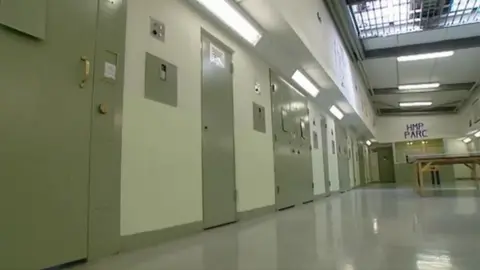Parc Prison: Rise in violence since smoking ban
 BBC
BBCA rise in the number of violent and self harm incidents at Parc Prison could be linked to the smoking ban, a review has found.
The report said the ban at the Bridgend site had been well-managed and some prisoners had since stopped smoking.
But it said tobacco and other contraband was still getting in and it was concerned about drones being used.
The prison's director Janet Wallsgrove said the number of violent incidents increased but were now dropping.
Although no analysis has been carried out, the review said the ban "might be a factor" in the rise in violence.
The 2016-17 report by the prison's independent monitoring board said despite initial resistance to the April 2016 ban, some prisoners had "seized the opportunity to stop smoking" and said they felt fitter as a result.
 PA
PAHowever, it said it was concerned drones were being used to deliver tobacco and other banned substances - sometimes direct to prisoners' cell windows.
The annual review said there was a worry about a general increase in violent incidents at Parc - a "disproportionate percentage" of which happened in the young offenders' unit, where there were also a number of assaults on staff.
But it said staff had a good working relationship with young offenders and the prison had introduced mentors and violence reduction representatives to work with inmates to cut the number of incidents.
The board said no study had been carried out to analyse the impact of the smoking ban on prisoners, but it was concerned it "might be a factor in the increased level of incidents of self-harm and violence".
'Upward trend'
Overall the review found Parc Prison was well managed and said the safety of prisoners was of "paramount importance".
It said education provision was satisfactory, with useful links to Bridgend College, and purposeful activities for inmates was generally very good.
Parc Prison director Janet Wallsgrove said it has faced "an upward trend in violent incidents" over the past year, particularly in the juvenile unit.
She said new methods used by staff had seen levels drop back since their peak in 2016.
"While this report recognises the challenges we face, it also makes clear that our team manages some incredibly difficult situations very well," she added.
"Our work with prisoners and their families is world-leading and there has been a 40% increase in the number of educational qualifications achieved by prisoners."
